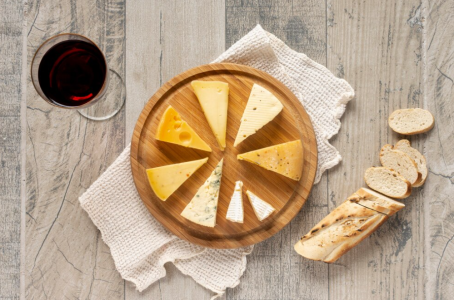Two cheeses at risk of extinction, scientists warn
By
- Replies 18
The thought of a world without the creamy, indulgent texture of cheese is enough to send any fan into a state of despair.
Yet, this is the stark warning issued by French scientists, who claim that two beloved kinds of cheese could be on the brink of extinction.
The National Centre for Scientific Research (CNRS) in France has raised the alarm that the traditional methods of making these cheeses have inadvertently impacted the fungus used in their production, potentially leading to their 'extinction'.
The production of Camembert and Brie, along with other cheeses, relies heavily on specific fungi.
The unique texture of Brie and Camembert rinds, for instance, is a result of the Penicillium camemberti fungus. Similarly, the distinctive blue spores in Roquefort come from Penicillium roqueforti.
Historically, these fungi grew naturally on cheeses stored in damp and cold cellars, particularly in Normandy, where Camembert was invented.
However, over time, cheesemakers found it more convenient to use laboratory-produced spores for the process.
The CNRS has pointed out that the over-reliance on cloned fungi strains has significantly reduced their genetic diversity.
This is particularly true for the albino strain of Penicillium camemberti, chosen by Normandy cheese producers to maintain the white rinds of Camembert.
Jeanne Ropars, a researcher at Paris-Saclay University's Laboratory of Ecology, Systematics and Evolution, explains: 'But what happened, as it does every time an organism large or small is subjected to overly drastic selection, is their genetic diversity has been greatly reduced.'
'The cheesemakers didn't realise they had selected a single individual, which is not sustainable.'
The food industry's dependence on asexual reproduction to perpetuate the moulds has led to a degeneration of the fungus strain in question.
This has resulted in a situation where Penicillium camemberti has lost its ability to sexually reproduce as well as its ability to produce asexual spores.
The CNRS warns that this could lead to the extinction of Camembert, which is already on the verge of extinction. The situation is also dire for Brie and other cheeses, although not to the same extent.
Tatiana Giraud, another researcher at the laboratory, suggests that the only way to reverse this trend is through ‘the diversity provided by sexual reproduction between individuals with different genomes’.
However, this would result in cheeses that do not always appear or taste identical.
The CNRS notes that cheese lovers will have to grow to appreciate more 'diversity in flavour, colour and texture' if they wish to keep enjoying these products.
This issue highlights the broader challenges facing the cheese industry in terms of sustainability.
The over-reliance on specific strains of fungi and the lack of genetic diversity pose significant threats to the future of many beloved cheeses.
Moreover, the industry is also grappling with other sustainability issues.
Last year, French cheesemakers expressed outrage over an EU packaging rule that could have outlawed the traditional round wooden boxes used to contain Camembert.
Critics argued that the cost of recycling the wood boxes would be prohibitive and that they are less harmful to the environment than the plastic alternative.
A heated debate sparked following the proposal to sync packaging across the bloc requiring it to be recyclable by 2030.
Chairman of the French Heritage Foundation, Guillaume Poitrinal, spoke of 'the madness of bureaucracy', noting: 'The wooden box—low carbon, light, biodegradable, made in France—is better for the planet than plastic made with Saudi oil, transformed in China with coal-powered electricity and which will end up in the oceans.'
However, the European Parliament has allowed for a ‘recyclability exception’ for lightweight wooden packaging, a news source reported.
Stéphanie Yon-Courtin, French Member of the European Parliament and Regional Councillor for Normandy, played a significant role in this current development.
On November 22, Yon-Courtin announced that an amendment, backed by the Renew Europe group, had been successfully passed.
Furthermore, Yon-Courtin also noted the value and importance of the amendment in providing more flexibility and options, especially for sectors such as lightweight wood, which is known for having less environmental impact than others.
'This regulation will provide greater flexibility, particularly for sectors such as lightweight wood, which is less polluting and for which creating a recycling cycle would be too costly,' Yon-Courtin said during the plenary vote.

What are your thoughts on this issue, dear readers? Are your favourite cheeses on the list? Let us know in the comments below.
Yet, this is the stark warning issued by French scientists, who claim that two beloved kinds of cheese could be on the brink of extinction.
The National Centre for Scientific Research (CNRS) in France has raised the alarm that the traditional methods of making these cheeses have inadvertently impacted the fungus used in their production, potentially leading to their 'extinction'.
The production of Camembert and Brie, along with other cheeses, relies heavily on specific fungi.
The unique texture of Brie and Camembert rinds, for instance, is a result of the Penicillium camemberti fungus. Similarly, the distinctive blue spores in Roquefort come from Penicillium roqueforti.
Historically, these fungi grew naturally on cheeses stored in damp and cold cellars, particularly in Normandy, where Camembert was invented.
However, over time, cheesemakers found it more convenient to use laboratory-produced spores for the process.
The CNRS has pointed out that the over-reliance on cloned fungi strains has significantly reduced their genetic diversity.
This is particularly true for the albino strain of Penicillium camemberti, chosen by Normandy cheese producers to maintain the white rinds of Camembert.
Jeanne Ropars, a researcher at Paris-Saclay University's Laboratory of Ecology, Systematics and Evolution, explains: 'But what happened, as it does every time an organism large or small is subjected to overly drastic selection, is their genetic diversity has been greatly reduced.'
'The cheesemakers didn't realise they had selected a single individual, which is not sustainable.'
The food industry's dependence on asexual reproduction to perpetuate the moulds has led to a degeneration of the fungus strain in question.
This has resulted in a situation where Penicillium camemberti has lost its ability to sexually reproduce as well as its ability to produce asexual spores.
The CNRS warns that this could lead to the extinction of Camembert, which is already on the verge of extinction. The situation is also dire for Brie and other cheeses, although not to the same extent.
Tatiana Giraud, another researcher at the laboratory, suggests that the only way to reverse this trend is through ‘the diversity provided by sexual reproduction between individuals with different genomes’.
However, this would result in cheeses that do not always appear or taste identical.
The CNRS notes that cheese lovers will have to grow to appreciate more 'diversity in flavour, colour and texture' if they wish to keep enjoying these products.
This issue highlights the broader challenges facing the cheese industry in terms of sustainability.
The over-reliance on specific strains of fungi and the lack of genetic diversity pose significant threats to the future of many beloved cheeses.
Moreover, the industry is also grappling with other sustainability issues.
Last year, French cheesemakers expressed outrage over an EU packaging rule that could have outlawed the traditional round wooden boxes used to contain Camembert.
Critics argued that the cost of recycling the wood boxes would be prohibitive and that they are less harmful to the environment than the plastic alternative.
A heated debate sparked following the proposal to sync packaging across the bloc requiring it to be recyclable by 2030.
Chairman of the French Heritage Foundation, Guillaume Poitrinal, spoke of 'the madness of bureaucracy', noting: 'The wooden box—low carbon, light, biodegradable, made in France—is better for the planet than plastic made with Saudi oil, transformed in China with coal-powered electricity and which will end up in the oceans.'
However, the European Parliament has allowed for a ‘recyclability exception’ for lightweight wooden packaging, a news source reported.
Stéphanie Yon-Courtin, French Member of the European Parliament and Regional Councillor for Normandy, played a significant role in this current development.
On November 22, Yon-Courtin announced that an amendment, backed by the Renew Europe group, had been successfully passed.
Furthermore, Yon-Courtin also noted the value and importance of the amendment in providing more flexibility and options, especially for sectors such as lightweight wood, which is known for having less environmental impact than others.
'This regulation will provide greater flexibility, particularly for sectors such as lightweight wood, which is less polluting and for which creating a recycling cycle would be too costly,' Yon-Courtin said during the plenary vote.
Key Takeaways
- Scientists from France’s National Centre for Scientific Research warn that Camembert and Brie cheeses could face extinction due to a decline in fungi.
- Attempts to make camembert with a standardised white rind have impacted the fungus Penicillium camemberti, vital for the cheese's texture and rind.
- The CNRS reported that camembert is on the verge of extinction, as the fungus has lost its ability to sexually reproduce and produce asexual spores.
- The CNRS suggests promoting sexual reproduction in fungi to increase genetic diversity, which could result in more flavour, colour, and texture diversity in cheeses.
What are your thoughts on this issue, dear readers? Are your favourite cheeses on the list? Let us know in the comments below.








